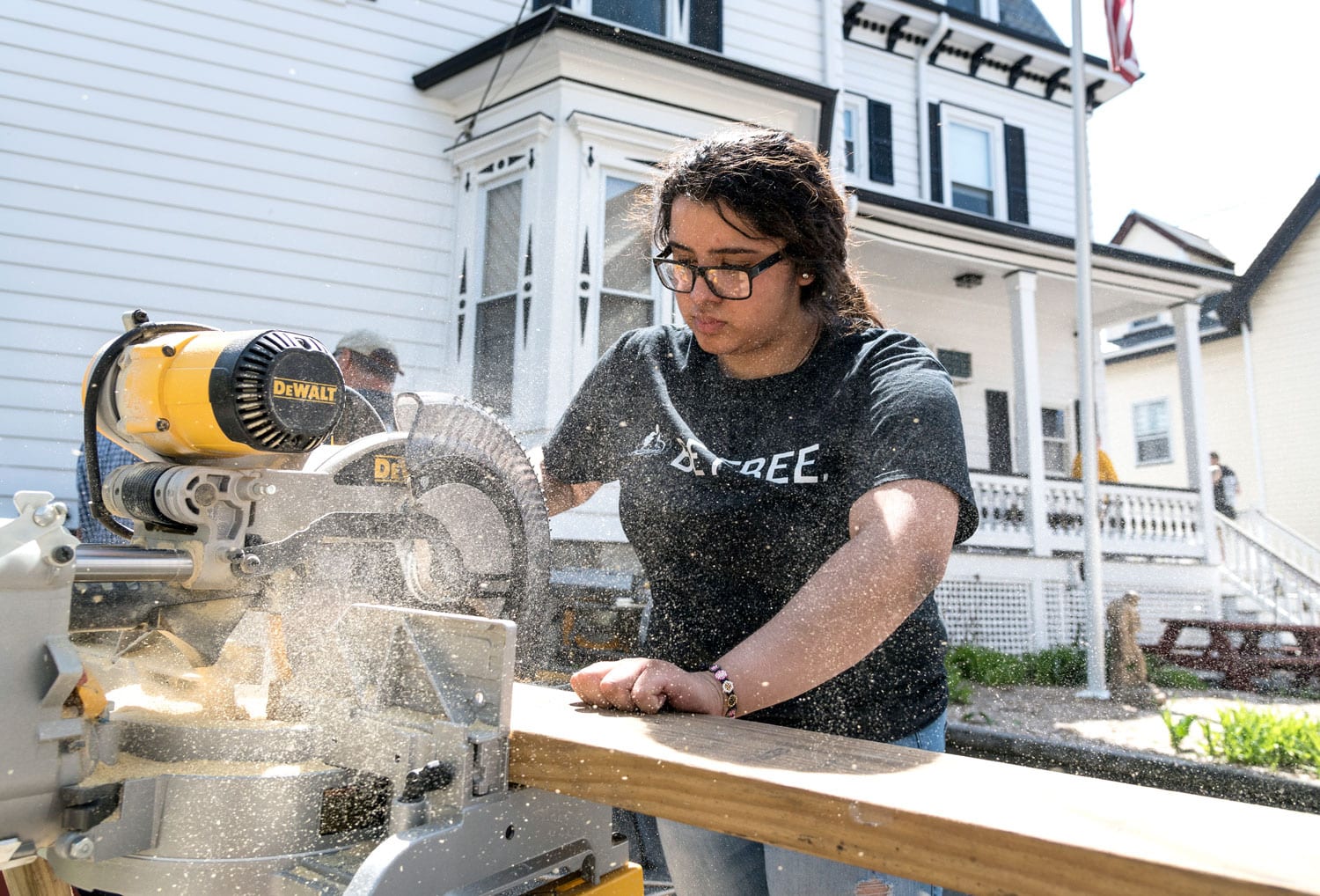LYNN — Seniors from Lynn Vocational Technical Institute teamed up with the GE Veterans Council on Wednesday to improve housing for disabled veterans.
Five Lynn Tech seniors from the school’s carpentry program spent part of the day renovating and shoring up the basement stairs of a home at 516 Essex St. that houses severely disabled veterans. Work included measuring, cutting and installing wood.
Kevin Erazo, 17, was interested in helping out after his teacher told his class about the work.
“He told us it was going to help out the veterans,” Erazo said. “I thought it would be a good cause.”
Erazo and his classmates were trying to re-establish the stairs because they were rotten and falling apart.
He’s thought about carpentry or construction as a possible career path, but he said it depends on if he gets into a college he likes. His plan is to study business or accounting.
Susan Campbell and Bernadette Forti, co-founders of Habitat PLUS (People Learning Useful Skills), Inc., own both 516 Essex St. and the house next door, 520 Essex St., which both house disabled veterans, who were placed through their organization.
Habitat PLUS, which was founded in 1989 and provides supported living to psychiatrically disabled veterans who would otherwise be homeless, offers a continuum of care through two living options, according to its website.
Forti said veterans are primarily referred to Habitat PLUS from VA Boston’s Community Residential Care Program where it’s assessed they can’t live independently. Habitat PLUS is the only CRC home that is a nonprofit, she said.
Fourteen disabled veterans live between the two Essex Street homes — 516 is the group home, or main house, which houses 10 veterans, and provides live-in staff and a high level of supervision to the veterans in their daily life.
Four veterans, who are graduates of the first program and demonstrate a skill level for more independent living, live at 520 Essex St., as part of the organization’s Step Up program, or cooperative apartment program.
“This isn’t a shelter,” Forti said. “It’s a home.”
Campbell said GE has been helping Habitat PLUS fix up the homes for about seven years, which has included work to improve porches, doors, and the driveway, and putting in windows.
Dave Reece, GE Veterans Council member, said about once a year, GE would run a volunteer event — past work has included replacing windows and siding and building walls. This week was the first time Lynn Tech has been enlisted by GE to help out.
Patrick Burke, who works at GE, said the GE Veterans Council has been trying to engage other groups to help with the work. Having Lynn Tech help is the start of growing that, while also giving kids an opportunity to learn.
“I’m really excited because they’re kids coming out and doing community work,” Campbell said.
Richard Wall, vocational department head at Lynn Tech, said the school would love to get more involved with the community. Students can learn to cut a piece of wood or make things in class, but to see the live aspects during the renovation project puts a real meaning on what they’re doing.
“Live work is the best kind of training and we have the teachers now who are interested in doing it,” Wall said.
Forti and Campbell met while working for a nonprofit serving developmentally delayed adults and would spend their lunch hours discussing ideas for opening a home for the disabled.
While doing private consulting work on the North Shore, Campbell learned about how many of the homeless on the streets of those communities were veterans and that many of them were struggling with psychiatric disabilities. Campbell’s cousin, Stanley Egan, was killed in Vietnam at 19 years old, so the population held a special place in her heart, according to the Habitat PLUS website.
Forti said they went to the VA about 29 years ago and pitched the idea of purchasing a property and creating a community of veterans supporting veterans.
Campbell and Forti purchased 516 Essex St. with their own money — the inside of the home wasn’t in horrible shape, but the outside needed attention. Campbell said when they bought 520, the building was condemned.
Over the years, about $85,000 has been put into the main house and approximately $100,000 has gone into the cooperative apartment building next door, which has been through grants and fundraising, along with materials and donated labor, Campbell said.
“GE is the glue,” Campbell said. “They bring us people who want to help us.”

